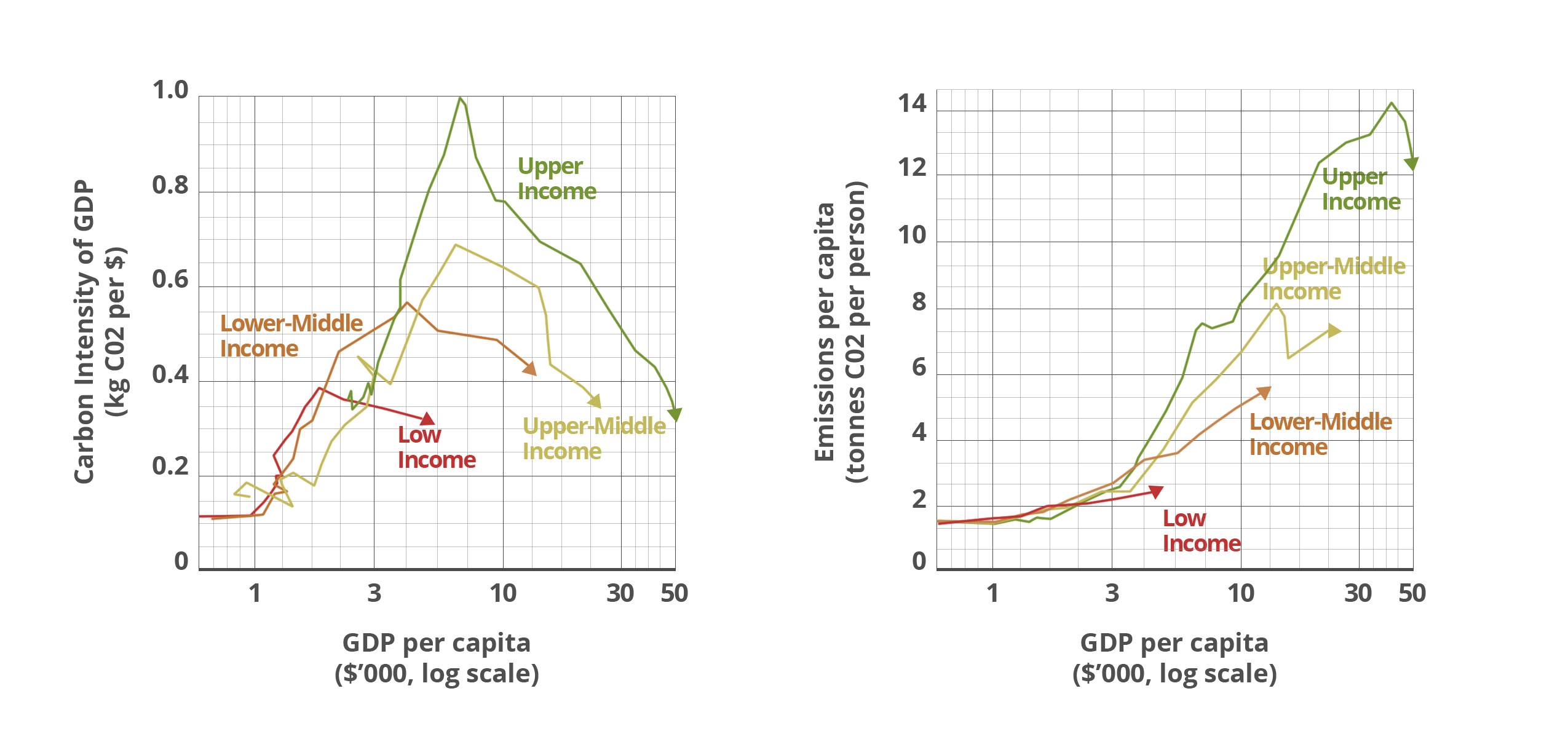When considering the effect of free economies on greenhouse gas emissions and climate resiliency, several factors come into play. In truth, the effectiveness of economic freedom on climate mitigation and adaptation will depend on which policy lever that increases or decreases economic freedom lawmakers use. More efficient tax policy or improving permitting processes could increase economic freedom, which could improve technological innovation1 and therefore increase economic and environmental efficiencies. That would result in fewer emissions per dollar of GDP. On the other hand, imposing regulations on power plants to reduce CO2 emissions would decrease economic freedom. One recent paper discusses the optimal and efficient level of economic freedom for prosperity and environmental protection.2
Several studies have examined the causal effects of economic freedom on CO2 emissions and environmental degradation using CO2 as a proxy, and the results have been mixed. Like other byproducts of industrial activity, it stands to reason that if higher levels of economic freedom result in higher levels of economic growth, it will also lead to higher levels of greenhouse gas emissions.
Research confirms this intuition. For instance, one analysis published in Environmental Science and Pollution Research in 2022 looked at the environmental outcomes of G-20 economies from 2000–2016. The authors found that the higher levels of investment and economic opportunity resulting from economic freedom put greater strains on countries’ ecosystems.3 The analysis from the Fraser Institute found no statistical significance between increases in economic freedom and CO2 emissions reductions.4
While it stands to reason that emissions increase as a country uses more energy and grows, it is also important to consider if the Environmental Kuznets Curve exists for CO2 emissions. If so, free market policies can help decouple and drive down emissions. A 2020 Research of Industrial Economies paper found encouraging results. The paper combines emissions growth, GDP per capita and rankings on the Fraser Institute’s Economic Freedom of the World Index to find that “available data from 155 countries observed in five-year periods between 1975 and 2015 indicate that economic freedom not only reduces overall CO2 emissions but also shifts the top point of the EKC to the left. As such, the evidence suggests that the transition to lower emissions technology appears at an earlier stage in economically free societies.” 5
Energy Transition Curve
Energy transition path of countries in each wave of economic development, between 1800 and 2019.6

If cleaner technologies, processes, and products are more cost-effective, developing countries will have the incentive to pursue those technologies as opposed to their higher-emitting counterparts. To the extent mature, clean energy sources (as well as all energy technologies) are unsubsidized, they will likely have greater chance of long-term economic success because there will be more transparency regarding the price at which these technologies are competitive in the market.
A 2019 study in the Journal of Developing Areas measured how various subcomponents of economic freedom (trade freedom, business freedom, freedom from corruption and fiscal freedom) affected CO2 emissions using panel data in 24 African countries from 1995-2013.7 The paper found that economic freedom increased environmental quality as measured by reductions in CO2 emissions, with fiscal freedom having a negative effect on CO2 emissions for all country-income levels, freedom from corruption and business freedom having a negative impact on CO2 emissions on upper-middle income countries, and trade freedom having a negative impact on CO2 emissions for lower-income middle countries.4
Other research has shown economic freedom’s positive impact on clean energy generation. A July 2023 study in Environmental Science and Pollution Research looked at the relationship between economic freedom and CO2 emissions in 138 countries from 1995–2018 and found “economic freedom has a direct and indirect negative effect on carbon emissions and that renewable energy consumption mediates the effect of economic freedom on carbon emissions.” 8
Many of the variables that measure a country’s economic freedom are also an indication of the size of government for a given country. That includes tax rates, spending levels, and the size of the regulatory state. As previously discussed, policy changes will sometimes create “win-win” scenarios, where reducing onerous, ineffective regulations and improving tax efficiencies will spur economic growth while improving the environment. Other regulations will restrict economic growth to reduce pollution, emphasizing the need for rigorous and transparent cost-benefit analyses.
There is not extensive literature measuring government size and CO2 emissions, but research published in the International Journal for Social Economics in May 2022 examined the relationship between economic freedom and CO2 emissions in several South Asian countries. The study found smaller government size and more market-oriented economies could reduce CO2 emissions by increasing green growth, arguing, “the role of the government needs to be redefined if not necessarily truncated.”9 Similarly, Environmental Science and Pollution Research found larger government increased CO2 emissions in Brazil, India, and China but a negative impact in Russia. 10
Another article, published in the International Journal of Environmental Research and Public Health in July 2022, found mutual interplay between government size and CO2 emissions when looking at European Union countries between 2000-2018.11 The authors performed a causality analysis of economic freedom, education and CO2 emissions and found that market-oriented economies and education can be significant contributors to improving the environment. By looking at the EU as a whole and specific member states, the authors concluded:
Both panel and country-level causality analyses point out that economic freedom, government size, international trade freedom, and education are significant determinants of environmental degradation proxied by CO2 emissions, although country-level findings partially differ depending on country-specific characteristics in line with the theoretical expectations. Therefore, reforms toward market-oriented economic structures and education can be used effectively to combat environmental degradation by using market-based environmental instruments, raising environmental awareness, and developing green or energy-efficient technologies. 12
Granted, determining what constitutes a “market-based” policy can sometimes be a matter of political debate. Furthermore, the unique attributes of a country’s economy, its policies, and its level of economic well-being may determine which policy reforms respective governments must prioritize.
Another consideration is how economic freedom can help countries better adapt to climate change. Free economies are wealthier, more innovative and have access to advanced technologies that enable people to better adapt to climate change. Having the economic means to construct stronger levees, sea walls, and more resilient infrastructure have helped save lives and protect communities. Advanced technologies such as early detection systems, visualization tools, up-to-date flood maps, computer modeling, satellite, and radar are several tools that scientists employ to track weather and storms. Affordable, reliable heat in the winter and air conditioning in the summer offer protection against extreme weather. Researchers are developing crops that better withstand heatwaves and droughts.13 These investments are not costless but can be a cost-effective solution to reduce the risks and costs of extreme weather.
One helpful tool that measures a country’s resiliency is the Notre Dame Global Adaptation Initiative’s Country Index. The index “uses 20 years of data across 45 indicators to rank over 180 countries annually based on their level of vulnerability, and their readiness to successfully implement adaptation solutions.”14 Given the connection between economic freedom and wealth, there is also a strong, positive correlation between those countries that are most economically free and those countries that are the most resilient.15
Notre Dame Global Adaptation Initiative's Country Index
A measure of a country’s vulnerability to the effects of climate change and readiness to implement solutions.
Use the slider to change the year
- Jiafeng Gu, “Sharing economy, technological innovation and carbon emissions: Evidence from Chinese cities,” Peking University, July-September 2022, https://www.elsevier.es/en-revista-journal-innovation-knowledge-376-articulo-sharing-economy-technological-innovation-carbon-S2444569X22000634 [↩]
- Jonas Rapsikevicius et al., “The Impact of Economic Freedom on Economic and Environmental Performance: Evidence from European Countries,” Sustainability, 2021, https://www.mdpi.com/2071-1050/13/4/2380 [↩]
- Alola, A.A., Alola, U.V., Akdag, S. et al. The role of economic freedom and clean energy in environmental sustainability: implication for the G-20 economies. Environ Sci Pollut Res 29, 36608–36615 (2022). https://doi.org/10.1007/s11356-022-18666-5 [↩]
- Ibid.[↩][↩]
- Bjørnskov, Christian (2020) : Economic Freedom and the CO2 Kuznets Curve, IFN Working Paper, No. 1331, Research Institute of Industrial Economics (IFN), Stockholm, https://www.econstor.eu/bitstream/10419/240474/1/wp1331.pdf [↩]
- Financial Times[↩]
- Kolade Sunday Adesina and John W. Muteba Mwamba, 2019. “Does Economic Freedom Matter For CO2 Emissions? Lessons From Africa,” Journal of Developing Areas, Tennessee State University, College of Business, vol. 53(3), pages 155-167, Summer.[↩]
- Bétila, R.R. Economic freedom and carbon emissions across the globe: the mediating effect of renewable energy consumption. Environ Sci Pollut Res 30, 86300–86327 (2023). https://doi.org/10.1007/s11356-023-28420-0 [↩]
- Jain, M. and Kaur, S. (2022), “Carbon emissions, inequalities and economic freedom: an empirical investigation in selected South Asian economies”, International Journal of Social Economics, Vol. 49 No. 6, pp. 882-913. https://doi.org/10.1108/IJSE-02-2021-0108[↩]
- Lijuan Chen, “How CO2 emissions respond to changes in government size and level of digitalization? Evidence from the BRICS countries,” Environmental Science and Pollution Research, July 31, 2021, https://link.springer.com/article/10.1007/s11356-021-15693-6 [↩]
- Gamze Sart et al., “Economic Freedom, Education and CO2 Emissions: A Causality Analysis for EU Member States,” International Journal of Environmental Research and Public Health, July, 2022, https://www.ncbi.nlm.nih.gov/pmc/articles/PMC9265646/ [↩]
- Sart G, Bayar Y, Danilina M, Sezgin FH. Economic Freedom, Education and CO2 Emissions: A Causality Analysis for EU Member States. Int J Environ Res Public Health. 2022 June 30;19(13):8061. doi: 10.3390/ijerph19138061. PMID: 35805730; PMCID: PMC9265646. [↩]
- Press release, “Clemson researchers continue study to develop heat-tolerant soybeans,” Clemson News, January 27, 2022, https://news.clemson.edu/clemson-study-focuses-on-developing-heat-tolerant-soybeans/ and Heidelberg University, “Scientists Have Created Genetically Modified Drought-Resistant Plants,” SciTechDaily, July 20, 2022, https://scitechdaily.com/scientists-have-created-genetically-modified-drought-resistant-plants/ [↩]
- University of Notre Dame, Notre Dame Global Adaptation Initiative (ND-GAIN), July 2022, https://gain.nd.edu/our-work/country-index/ [↩]
- Nick Loris et al., “Climate and Freedom Agenda,” Conservative Coalition for Climate Solutions, June 2022, https://www.c3solutions.org/wp-content/uploads/2022/06/C3-Solutions-Climate-and-Freedom-Agenda.pdf [↩]
